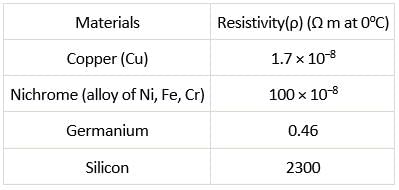Grade 12 Exam > Grade 12 Tests > Test: Resistivity of Various Materials (NCERT) - Grade 12 MCQ
Test: Resistivity of Various Materials (NCERT) - Grade 12 MCQ
Test Description
5 Questions MCQ Test - Test: Resistivity of Various Materials (NCERT)
Test: Resistivity of Various Materials (NCERT) for Grade 12 2025 is part of Grade 12 preparation. The Test: Resistivity of Various Materials (NCERT) questions and answers have been prepared
according to the Grade 12 exam syllabus.The Test: Resistivity of Various Materials (NCERT) MCQs are made for Grade 12 2025 Exam.
Find important definitions, questions, notes, meanings, examples, exercises, MCQs and online tests for Test: Resistivity of Various Materials (NCERT) below.
Solutions of Test: Resistivity of Various Materials (NCERT) questions in English are available as part of our course for Grade 12 & Test: Resistivity of Various Materials (NCERT) solutions in
Hindi for Grade 12 course.
Download more important topics, notes, lectures and mock test series for Grade 12 Exam by signing up for free. Attempt Test: Resistivity of Various Materials (NCERT) | 5 questions in 5 minutes | Mock test for Grade 12 preparation | Free important questions MCQ to study for Grade 12 Exam | Download free PDF with solutions
Detailed Solution for Test: Resistivity of Various Materials (NCERT) - Question 1
Detailed Solution for Test: Resistivity of Various Materials (NCERT) - Question 2
Test: Resistivity of Various Materials (NCERT) - Question 3
The resistivity of alloy manganin is
Detailed Solution for Test: Resistivity of Various Materials (NCERT) - Question 3
Test: Resistivity of Various Materials (NCERT) - Question 4
Arrange the following materials in increasing order of their resistivity,
Nichrome, Copper, Germanium, Silicon
Detailed Solution for Test: Resistivity of Various Materials (NCERT) - Question 4
Test: Resistivity of Various Materials (NCERT) - Question 5
What is the order of magnitude of the resistance of a dry human body?
Detailed Solution for Test: Resistivity of Various Materials (NCERT) - Question 5
Information about Test: Resistivity of Various Materials (NCERT) Page
In this test you can find the Exam questions for Test: Resistivity of Various Materials (NCERT) solved & explained in the simplest way possible.
Besides giving Questions and answers for Test: Resistivity of Various Materials (NCERT), EduRev gives you an ample number of Online tests for practice
Download as PDF















